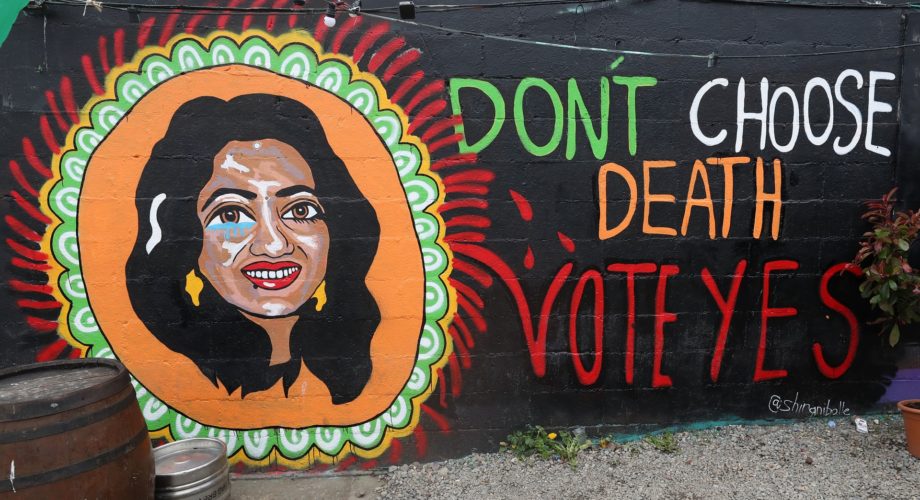
A pro-choice mural in Dublin featuring Savita Halappanavar, urging a yes vote in the referendum.
Her death was the “end of the world” to her family, and a catalyst for an historic vote this week that could change Ireland’s constitution. Now, more than five years after Savita Halappanavar lost her life after a miscarriage in a Galway hospital, her father has urged voters to repeal the clause of the constitution that he says contributed to her death, and legalise abortion.
“I hope the people of Ireland remember my daughter Savita on the day of the referendum, and that what happened to her won’t happen to any other family,” said Andanappa Yalagi by phone from his home in Karnataka, in south-west India.
He said his daughter’s death at the age of 31 had devastated the family. “It’s still very emotional after five years. I think about her every day. She didn’t get the medical treatment she needed because of the eighth amendment. They must change the law.”
Halappanavar’s husband, Praveen, has not spoken publicly about her death since an out-of-court settlement was agreed shortly before a medical negligence case was due to open at Ireland’s high court in 2016.
But in the weeks after his wife’s death, he said: “It was the end of the world. She wanted to live, have babies … I still can’t believe she’s not with us. We just can’t believe that in the 21st century, something like this would happen.”
The family believe that at the centre of their tragedy was a clause in Ireland’s constitution that gives protection to an unborn child, which has resulted in abortion being illegal in almost all circumstances. Voters will decide whether to repeal or retain this clause, known as the eighth amendment, in Friday’s referendum.
On Tuesday the chair of an official investigation into Halappanavar’s death, Prof Sir Sabaratnam Arulkumaran, called on voters to back the repeal of the clause, saying it tied doctors’ hands.
Halappanavar, a dentist from Karnataka, was 17 weeks pregnant with her first child when she sought advice at University Hospital Galway for intense back pain on Sunday 21 October 2012.
Within hours, medical staff concluded that a miscarriage was inevitable, although a foetal heartbeat could be heard. The plan was to allow the pregnancy to end naturally.
After being told of the risk of infection following the rupture of the foetal membranes, the Halappanavars asked whether it was possible to medically induce the miscarriage. A consultant later recalled saying: “Under Irish law, if there’s no evidence of risk to the life of the mother, our hands are tied as long there’s a foetal heart[beat].” No intervention took place.
On the morning of Wednesday 24 October, the medical team diagnosed infection and, later, septic shock. A plan was made, but not enacted, to give Halappanavar a drug to induce an abortion. She spontaneously miscarried mid-afternoon and was subsequently admitted to intensive care, where she died in the early hours of Sunday 28 October, almost a week after being admitted to hospital.
In media interviews in the following weeks, Praveen Halappanavar said he and his wife had repeatedly asked for the pregnancy to be terminated after her admission to hospital, but they had been told “this is a Catholic country”.
When the news of Halappanavar’s death broke, thousands of people took part in candlelit vigils and protests across Ireland, calling for changes to allow women to have access to legal abortions. Campaigners for reform said she was a tragic example of how the Irish state failed to protect its citizens. Amnesty International said the law left women in Ireland “in a very vulnerable position”.
Anti-abortion campaigners claimed the case was being exploited and distorted by those with an agenda to liberalise Ireland’s stringent laws. The Catholic bishops of Ireland said a woman and her unborn child had an equal right to life.